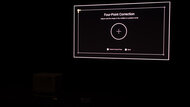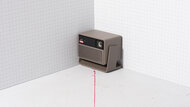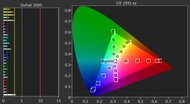If you're looking for the best 4k-capable projector, many choices are available, although true 4k projectors are extremely expensive and out of reach of most shoppers. For that reason, all of the projectors on this list use pixel-shifting technology, which outputs multiple 1080p images and shifts the pixels in such a way as to cause them to overlap. With the help of image processing, the resulting projection is much sharper than a traditional 1080p projection, and the technology allows for much cheaper products than native 4k projectors with comparable image quality.
We've bought and tested more than 60 projectors, and below, you'll find the best pixel-shifting models to buy. We only cover consumer models, not high-end products meant for enthusiasts. If you're shopping for something less expensive, check out the best cheap projectors. Or, if you're looking for a projector for your home but don't necessarily need it to have 4k pixel-shifting technology, look at our lists of the best projectors and best home projectors. You can also vote on which projectors you want us to purchase and test.
Quick Look
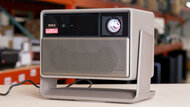




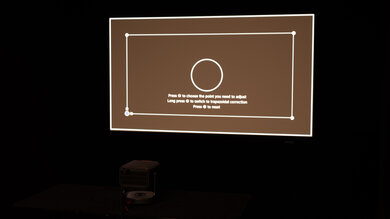
We've independently bought and tested over 60 projectors, and we've published all the detailed results for each so you can decide which one to buy. These have all been tested under the same standardized methodology, allowing you to compare them side by side. We still have all these projects in our lab so we can continually go back and compare them to ensure our reviews are still accurate. All our test methodology is also public on our website, so you can validate the results yourself.
-
Best 4k Projector
 Movies8.9Gaming7.8Brightness9.2Contrast8.6Imaging TechnologyDLPLight SourceLaserSee all our test resultsNative ResolutionPixel Shift 4k
Movies8.9Gaming7.8Brightness9.2Contrast8.6Imaging TechnologyDLPLight SourceLaserSee all our test resultsNative ResolutionPixel Shift 4kIf you want the best 4k projector we’ve tested, get the XGIMI HORIZON 20 Max. It uses a single-chip DLP with 4k pixel-shifting, so 4k movies and games look noticeably sharper than on 1080p models. Its RGB laser light source is extremely bright and very uniform, so SDR stays punchy on a big screen in a dark room and still holds up with a few lights on. Contrast is excellent for a DLP unit and remains strong from dark to bright scenes, so shadow detail and highlights both come through cleanly. Out of the box, color is already accurate enough for most people, and its very wide color gamut makes HDR titles look rich and saturated; if you calibrate it, it can look reference-grade. It also supports Dolby Vision, HDR10+, HDR10, and HLG, so it works well with modern streaming apps.
For gaming, it’s a top-tier option. In its Game Mode, input lag is low enough at 4k and high-refresh rate 1080p (120Hz and 240Hz) that it feels on par with dedicated gaming-focused models. It also supports VRR, which helps reduce tearing and smooth out motion when frame rates fluctuate. There is some visible artifacting with VRR enabled, especially when frame rates are very unstable, so it works best if your game holds a relatively steady or capped FPS, but when it does, the experience is solid for both single-player and faster titles. Rounding things out, you get a motorized zoom, generous lens shift, autofocus, auto keystone, and a swivel stand, plus strong eARC audio passthrough if you want to pair it with a soundbar or AVR. All told, the XGIMI HORIZON 20 Max is the best 4k laser projector you can buy right now.
-
Best Ultra-Short-Throw 4k Projector
 Movies8.1Gaming7.0Brightness7.8Contrast8.3Imaging TechnologyDLPLight SourceLaserSee all our test resultsNative ResolutionPixel Shift 4k
Movies8.1Gaming7.0Brightness7.8Contrast8.3Imaging TechnologyDLPLight SourceLaserSee all our test resultsNative ResolutionPixel Shift 4kIf you want a true "projector-as-TV" setup that lives right against the wall, the Hisense PX3-PRO is the ultra-short-throw 4k projector to get. Its pixel-shifted 4k image looks razor-sharp at normal sofa distances, and because it sits just inches from the wall, you can drop it on a low media console and still fill an 80- to 150-inch screen. The TriChroma laser light engine is very bright for a UST with strong contrast, so movies keep good shadow detail instead of looking washed out. The color gamut is huge, which helps HDR content look rich and punchy once you dim the room. Out of the box, accuracy is only okay, but it responds well to calibration if you're chasing a more reference-style image.
For gaming, the projector is best seen as a solid "secondary use" option. Over HDMI, it accepts 4k @ 60Hz and up to 1080p @ 240Hz: 4k/60 is fine for slower cinematic titles, while 1080p/120 and especially 1080p/240 feel much snappier and work well for faster games, even if it's not a dedicated esports projector. The Hisense also works nicely as a full smart-TV replacement. Google TV is built in, with Dolby Vision and HDR10+ support, Wi-Fi 6E, Bluetooth 5.3, Chromecast, and AirPlay 2, so you can stream without adding a dongle. Two HDMI 2.1 ports handle your consoles or PC, while a third HDMI with eARC makes it easy to pass audio to a soundbar or AVR if you outgrow the built-in 50W speakers. Paired with a good UST ALR screen, it's the best 4k home theater projector for a bright TV-like image from right up against the wall.
-
Best Short-Throw 4k Projector
 Movies8.4Gaming7.5Brightness8.6Contrast7.9Imaging TechnologyDLPLight SourceLaserSee all our test resultsNative ResolutionPixel Shift 4k
Movies8.4Gaming7.5Brightness8.6Contrast7.9Imaging TechnologyDLPLight SourceLaserSee all our test resultsNative ResolutionPixel Shift 4kLooking for the best 4k home theater projector, but want it to be a short-throw unit? Go with the Hisense C2 Ultra. Its pixel-shifted 4k image looks crisp on a big screen, and the laser light engine gets bright enough for a living room with a few lights on while still looking excellent once you dim things down. Contrast is very good, so dark scenes keep real depth instead of turning gray, and the color gamut is extremely wide, which helps HDR movies and shows look rich and saturated. Out of the box, it's already quite accurate, and it cleans up nicely with calibration if you're picky.
For gaming, the Hisense is a decent option. Input lag at 4k @ 60Hz and 1080p @ 60Hz is comfortably low, so story-driven console titles feel responsive, and 1080p @ 240Hz works well for fast PC games. Its weak spot is 1080p @ 120Hz, where latency jumps more than we'd like, so if you're chasing the smoothest 120 fps experience and don't actually need short-throw placement, something like the XGIMI HORIZON 20 Max or a cheaper gaming-focused model such as the ViewSonic PX701-4K below is a better fit. Hisense's VIDAA smart platform is built in, with official Netflix plus Dolby Vision and HDR10+ support, along with Wi-Fi and Ethernet, so you can stream without a dongle. The 2.1-channel 40W JBL sound system gives you good audio from the box, and the eARC port passes modern surround formats cleanly if you add a soundbar or AVR. The rotating gimbal stand and autofocus, auto-keystone, and obstacle-avoidance tools make it easy to drop it on a low table and line it up with your screen.
-
Best Outdoor 4k Projector
 Movies8.6Gaming7.4Brightness8.7Contrast8.1Imaging TechnologyDLPLight SourceLaserSee all our test resultsNative ResolutionPixel Shift 4k
Movies8.6Gaming7.4Brightness8.7Contrast8.1Imaging TechnologyDLPLight SourceLaserSee all our test resultsNative ResolutionPixel Shift 4kIf you want the best 4k projector specifically for outdoor use, pick the Anker Nebula X1. It's a short-throw, pixel-shift 4k model with a built-in handle and chunky speakers, so it's clearly designed to live on a patio table or deck rather than in a permanent home theater rack. The setup is quick thanks to autofocus and automatic keystone, and once you dim nearby lights, it throws a sharp, bright image with great contrast and very accurate colors. In fact, its overall image quality barely edges out the Hisense C2 Ultra, which is also an ST unit, so movies and sports look a bit cleaner and more natural than you'd expect from a "party" projector.
Compared to the Hisense, the Nebula X1 is very much the outdoor specialist. The Anker is easy to carry for a mid-sized unit, its short-throw lens is great for projecting a big picture in a tight backyard or patio, and Anker sells bundles that really lean into that use case: extra wireless speakers, an Anker SOLIX battery pack for off-grid movie nights, and even a microphone for karaoke or events. Gaming, though, is where the C2 Ultra above pulls ahead. The Nebula X1 is capped at 60Hz with decent but not cutting-edge input lag, so it’s fine for casual 4k console play, while the Hisense supports a wider range of refresh-rate options and has more HDMI inputs plus far more capable audio passthrough for a full surround setup indoors. Still, overall, if you mostly watch outside and want a sharp, accurate 4k picture in a grab-and-go package, the Anker Nebula X1 is the best outdoor 4k projector you can buy.
-
Best Budget 4k Projector
 Movies6.8Gaming7.7Brightness7.0Contrast7.6Imaging TechnologyDLPLight SourceLampSee all our test resultsNative ResolutionPixel Shift 4k
Movies6.8Gaming7.7Brightness7.0Contrast7.6Imaging TechnologyDLPLight SourceLampSee all our test resultsNative ResolutionPixel Shift 4kIf you want the cheapest way to play 4k games on a huge screen and care way more about speed than picture finesse, go for the ViewSonic PX701-4K. It's a 4k pixel-shift projector with decent brightness and good contrast, so movies and games still look okay in a dark room, even if blacks aren't especially inky. The catch is color: the ViewSonic has a relatively narrow color gamut, its colors look a bit dull, and accuracy is poor out of the box and barely improves with calibration. HDR10 and HLG are supported, but with the limited gamut and modest color brightness, HDR content never really pops, so think of this mostly as an SDR projector.
Where it absolutely shines is gaming performance. Both HDMI 2.0 inputs accept 4k @ 60Hz and up to 1080p @ 240Hz, and input lag stays comfortably low at every supported refresh rate, so fast shooters and racers feel instantly responsive. If your priority is the quickest, smoothest gaming experience on a big 4k-capable projector and you're willing to live with flat, inaccurate color, this thing is a steal. There's no smart OS, Wi-Fi, or Bluetooth, so you'll want to add your own streaming stick, but the USB port can power it, so you don't need an extra outlet. Overall, the ViewSonic PX701-4K is the Best Budget Gaming 4k Projector: it's not for picture purists, but it has fantastic value for competitive gamers on a tight budget.
-
Best Portable 4k Projector
 Movies7.1Gaming5.3Brightness5.5Contrast8.3Imaging TechnologyDLPLight SourceLaserSee all our test resultsNative ResolutionPixel Shift 4k
Movies7.1Gaming5.3Brightness5.5Contrast8.3Imaging TechnologyDLPLight SourceLaserSee all our test resultsNative ResolutionPixel Shift 4kIf you want a true 4k projector you can toss in a bag, the LG CineBeam Q is the best portable option. It uses 4k pixel-shifting with an RGB laser light source, so movies and games look much sharper and cleaner than on other typical 1080p portables, with rich color and surprisingly great contrast for something this small. It can throw up to a 120-inch image, and the 360-degree handle doubles as a stand, so you can easily tilt it at a wall or even the ceiling. Like most portables, it really prefers a dim or dark room; it's not meant to fight a lot of ambient light, but once the lights are down, the image looks crisp and cinematic.
Because it runs LG's webOS smart platform, you get built-in apps like Netflix, Prime Video, Disney+, YouTube, and Apple TV without needing a streaming stick, plus AirPlay and screen mirroring for phones and laptops. HDMI and USB-C inputs cover consoles and laptops, eARC lets you send audio to a soundbar or AVR, and the built-in Bluetooth speaker is fine for casual use. There's no internal battery, but you can power it from an external USB-C battery pack for backyard or camping use. Compared to full-size 4k projectors like the Anker Nebula X1, the CineBeam Q isn't as bright or as versatile for a permanent living-room setup, but if portability and style matter more than raw output, it's the nicest-looking and most capable 4k portable we've seen.
Notable Mentions
-
BenQ X3100i:
The BenQ X3100i is a good, cheaper alternative to the XGIMI HORIZON 20 Max if you mostly care about 4k gaming. It doesn't get as bright or look as refined overall, but it still offers low input lag at 4k and high-refresh-rate gaming at 1080p, making it a strong value pick if you want top-tier gaming responsiveness for less money.
See our review -
BenQ X500i:
The BenQ X500i is a nice middle-ground 4k gaming projector between the XGIMI HORIZON 20 Max and the ViewSonic PX701-4K. It doesn’t look as refined or get as bright as the XGIMI, but it offers better overall picture quality and a richer feature set than the cheaper ViewSonic while still delivering low input lag and high-refresh 1080p support.
See our review -
Epson Home Cinema 5050UB:
The Epson Home Cinema 5050UB is still a great 4k home-theater projector if you mostly watch movies in a dark room, but compared to the XGIMI HORIZON 20 Max, it's starting to feel dated. Its contrast is just as good as the XGIMI, yet it's dimmer and has no built-in smart OS, and its barebones gaming support makes the brighter, sharper, and far more convenient XGIMI the better choice for most people.
See our review -
Valerion VisionMaster Pro 2:
The Valerion VisionMaster Pro 2 is a solid premium 4k projector, but compared to the XGIMI HORIZON 20 Max, it trails in brightness, contrast, out-of-the-box color accuracy, and gaming responsiveness. Its main advantage is that it runs noticeably quieter under load, which can be appealing if you’re very sensitive to fan noise.
See our review -
XGIMI AURA 2:
The XGIMI AURA 2 is a strong ultra-short-throw alternative to the Hisense PX3-PRO if you want a bright, sharp 4k image with more accurate colors out of the box. Overall, though, the Hisense still has a slight edge thanks to its slightly better contrast, much wider color gamut, and more robust high-refresh rate gaming features.
See our review
Recent Updates
Nov 21, 2025:
The XGIMI HORIZON 20 Max replaces the BenQ X3100i as the 'Best 4k Projector' due to its excellent image quality and top gaming chops; the BenQ is now a Notable Mention. Otherwise, all picks have been rewritten, and we added some picks to the Notable Mentions for comprehensive coverage of the 4k pixel-shift market.
Apr 11, 2025:
Made sure that our recommendations are still accurate and available for purchase.
Jan 06, 2025:
The Hisense PX3-PRO replaced the Epson EpiqVision Ultra LS800 in the Notable Mentions due to the Hisense's superior performance and feature set.
Oct 09, 2024: Made sure that our picks are all still widely available for purchase.
Sep 19, 2024: Replaced the Epson EpiqVision Ultra LS800 with the BenQ X500i as the 'Best Short-Throw 4k Projector' since the BenQ is the better product overall and comes in at a lower price. Also updated our Notable Mentions.
All Reviews
Our recommendations above are what we think are currently the best pixel shift projectors for most people to buy. We factor in the price (a cheaper projector wins over a pricier one if the difference isn't worth it), feedback from our visitors, and availability (no models that are difficult to find or almost out of stock everywhere).
If you would like to do the work of choosing yourself, here's the list of the best pixel-shifting projectors. Be careful not to get too caught up in the details. While no projector is perfect, many are good enough for most uses; however, avoid the worst models to ensure adequate quality.

